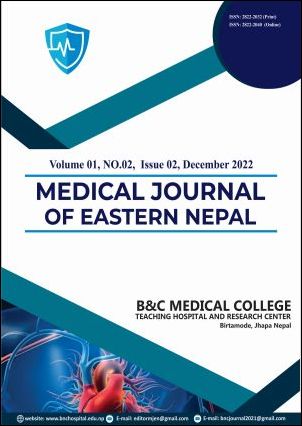Knowledge, Attitude and Practice of Adverse Drug Reactions (ADRS) Reporting in Nursing Staffs of Tertiary Care Hospital
DOI:
https://doi.org/10.3126/mjen.v1i02.51162Keywords:
KAP, ADRS, Nurses, Janakpur MunicipalityAbstract
Background Adverse Drug Reactions (ADRs) are adverse consequences of drug therapy and are a major cause of morbidity and mortality. Approximately 2.9-5.6% of all hospital admissions are due to ADRs and up to 35% of hospitalized patients experience ADRs during their hospital stay. Therefore, the study assesses nurses’ knowledge, attitudes and practices (KAP) for monitoring and reporting spontaneous adverse drug reactions (ADRs).
Methods In this observational study, 155 professional nurses with Proficiency Certificate Level (PCL), Bachelor Nurses and Masters working in various hospitals and academic institutes in Janakpur Municipality were selected to complete 19 pre-validated questionnaires on knowledge, attitudes and practice of ADR monitoring and reporting’ response. The data were converted by a predetermined scoring method and subjected to statistical analysis.
Results Most participants from PCL Nursing (52.25%), participants from Bachelor Nursing (35.48%) and the fewest participants from Master Nursing (12.25%) were between 26 and 35 years old. Regarding ADRs knowledge, the majority of the Master Nurses (86.18%) answered the question correctly. ADR that reported regularly, most certificate nurses disagreed (33.3%) and more certificate nurses were neutral (38.2%) and some certificate nurses were agreed (28.3%). Most master nurses (63.1%) had patients with ADRs, but bachelor nurses (52.7%) and certificate nurses (64.2%) had not experienced any patients with ADRs in the past year. Master nurses (78.9%) were aware of the response to ADRs reporting and monitoring, but most certificate nurses (83.9%) and bachelor nurses (65.5%) were unaware of the ADRs reporting and monitoring response.
Conclusion We conclude that KAP of ADRs in nurses is not sufficient especially in certificate and bachelor nurses. But master level nurses responded well. This is due to their knowledge, attitude and practices on ADRs reporting and monitoring.
Downloads
Downloads
Published
How to Cite
Issue
Section
License
Copyright (c) 2022 B & C Medical College and Teaching Hospital and Research Centre

This work is licensed under a Creative Commons Attribution 4.0 International License.
CC BY: This license allows reusers to distribute, remix, adapt, and build upon the material in any medium or format, so long as attribution is given to the creator. The license allows for commercial use.




